From Baltimore to Berlin; Maryland National Guardsman, German military exchange experience
By Capt. Kurt Rauschenberg, 115th Military Police Battalion —
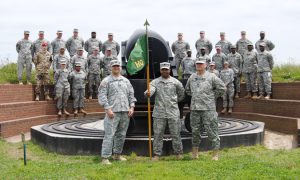
Capt. Thomas Werft, German Army exchange officer, stands with his host unit, Headquarters and Headquarters Detachment of the 115th Military Police Battalion, Maryland National Guard during a tour of Fort McHenry in Baltimore, June 7, 2015.
I never had the opportunity to visit Germany until I filled out an application to train and receive training from the German Armed Forces.
The Military Reserve Exchange Program, established between the U.S. Office of the Secretary of Defense Reserve Affairs and German Ministry of Defense in 1985, promotes unique training experiences and cultural education for reserve component officers. Each year both the U.S. and German military sends approximately 22 reserve component officers to receive training and share experiences within their individual skill sets. The United Kingdom and Denmark military also has an exchange program partnership with the U.S. military.
I found the program invaluable in the sense of enabling U.S. military members to see and participate firsthand in another country’s military operations and best practices. This was one of those opportunities which not only develops a military officer professionally, but promotes personal friendships and building relationships abroad.
I was one of three Maryland National Guardsmen and one of 21 overall U.S. military officers participating in the exchange program. As the commander of Headquarters and Headquarters Detachment, 115th Military Police Battalion, I was presented with a unique opportunity to host a German military police officer, Capt. Thomas Werft, in Salisbury, Md., during annual training in June. Werft, a 16-year German military police officer or Feldjäger of the Bundeswehr.
“I got the impression the U.S. Army and Bundeswehr were very similar in terms of chain of command on a company and battalion level,” said Werft. “Although, the concept of a reserve [component] differs much [more] than I expected, the U.S. Army supports the reserves in a better way and they also expect more from the soldiers.”
Werft was one of 21 German Bundeswehr officers to visit and train with U.S. reserve military components and one of four to train with the Maryland National Guard.
“Overall I would say we are quite close in our military principles and thinking… and here we [U.S. Army and Bundeswehr soldiers] have the same mindset,” Werft said.
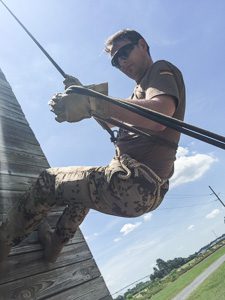
German Army Capt. Thomas Werft learns to repel with Headquarters and Headquarters Detachment of the 115th Military Police Battalion, Maryland National Guard in Salisbury, Md., June 16, 2015.
Werft participated in a battalion-level exercise requiring him to perform functions of the U.S. military decision making process, mobilize as a member of the MDNG, and conduct military police tasks as a quick reaction force soldier during a civil disturbance exercise in Ocean City, Md.
“It’s the exchange of thoughts, mindset and impressions,” Werft said. “And I recognized it during the program, even more. It’s building relationships with people which will outlast the exchange program itself.”
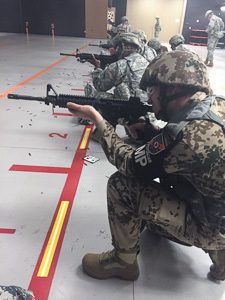
German Army Capt. Thomas Werft qualifies on the M4 rifle with Headquarters and Headquarters Detachment of the 115th Military Police Battalion, Maryland National Guard at Fort Meade, Md., June 15, 2015.
Following Werft’s training experience with the MDNG, I departed Baltimore for Germany for two week to train in Berlin. However, rather than a military police officer, I performed the role of a public affairs officer which is my secondary skill. I worked with the German Military of Defense’s editorial service called Redaktion der Bundeswehr.
To train with the German public affairs was a big surprise for me, but also very beneficial since I’ll soon be the public affairs officer for the 58th Expeditionary Military Intelligence Brigade.
I was able to not only grasp onto to the best practices of this macro-level organization, but provided my experience as a public affairs officer at the National Guard Bureau in Arlington, Va.
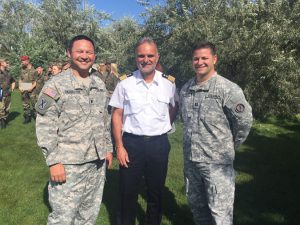
Maryland National Guardsman, Capt. Kurt M. Rauschenberg, and Utah National Guardsman, Lt. Col. Steven A. Fairbourn stand with the commander of the Center of Military Information in Berlin, Germany, Sept. 7, 2015.
In addition to my military role, I’m also a media relations specialist with NGB as a federal civilian and was joined in Berlin with Lt. Col. Steven Fairbourn, public affairs officer for the Utah National Guard. Throughout the two weeks, Fairbourn and I received an introduction to each function of German Ministry of Defense public affairs, which is the equivalent of Defense Media Activity at Fort Meade, Md., under the U.S. Office of the Assistance Secretary of Defense.
Redaktion der Bendeswehr provides the German Ministry of Defense with state of the art media technology, various media content for three news publications, and social media expertise. Each department provided Fairbourn and I a detailed lesson on the critical public affairs roles they serve under the Ministry of Defense. Our host, German navy commander Peter Vossieg, facilitated an introduction to all ministries of the German government.
“It was a true honor having our American counterparts here with us,” said Vossieg. “We all benefit from these exchanges.”
On the last day of their exchange, Fairbourn and I acquired a story involving the U.S. Chairman of the Joint Chiefs of Staff, Gen. Martin E. Dempsey, receiving a prestigious award known as the Knight Commander’s Cross of the Order of Merit of the Federal Republic of Germany, which was presented by Germany’s Chief of Defense, Gen. Volker Wieker.
I was completely blown away to have even been in the same room as the highest military official for both the U.S. and German military. Not only was I able to meet both our nation’s top generals, but we also produced a story on the award he received, which is now being published in the German military’s newspaper and magazine.
The story Fairbourn and I wrote will be the first English written story published in the Aktuell, the Bundeswehr’s newspaper, and Y-Magazin magazine. These publications have been active since 1965 and are distributed to all Bundeswehr units and offices under the Ministry of Defense.
To actually contribute a story in German news publications was amazing. I truly hope we can continue working closely with our German counterparts in the future and not let it end here.
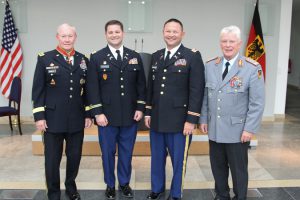
Maryland National Guardsman, Capt. Kurt M. Rauschenberg, and Utah National Guardsman, Lt. Col. Steven A. Fairbourn stand with U.S. Army Gen. Martin E. Dempsey, chairman of the Joint Chiefs of Staff, and German Army Gen. Volker Wieker, Germany’s Chief of Defense, during an award ceremony in Berlin, Germany, Sept. 10, 2015.
